

Informative Speech Thesis Statement
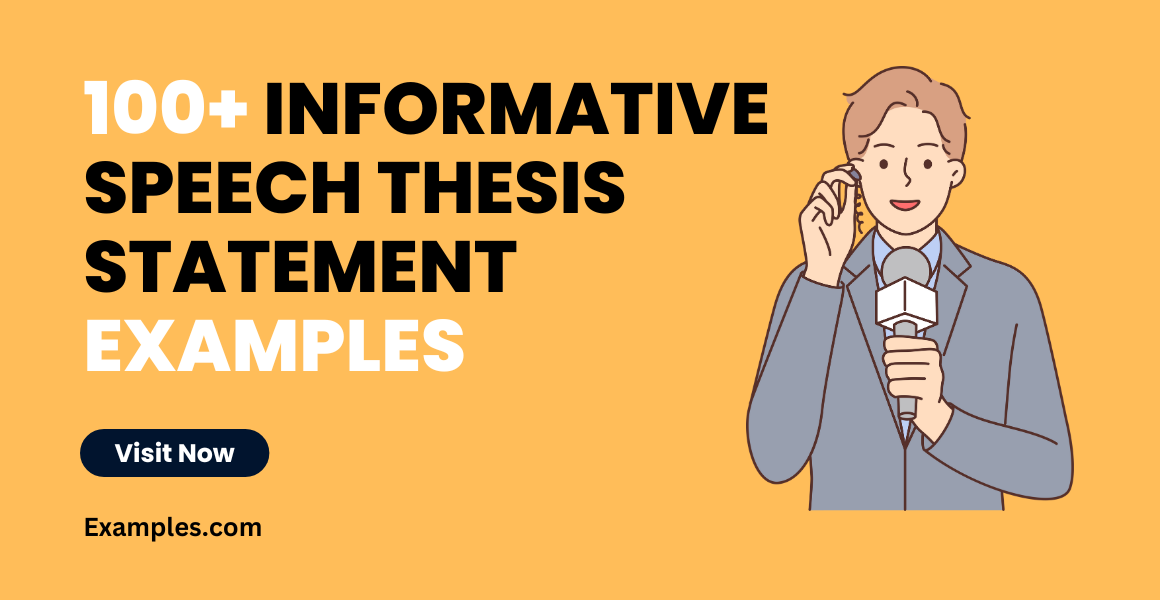
Unlock the power of effective communication with informative speech thesis statement examples. In this comprehensive guide, we’ll explore the art of crafting compelling thesis statements for informative speeches. From unraveling the intricacies of informative speech thesis statements to providing step-by-step writing strategies, you’ll gain valuable insights into captivating your audience’s attention and delivering informative speeches that leave a lasting impact. Elevate your speaking prowess with expert tips tailored to engaging and enlightening your listeners.
What is an Informative Speech Thesis Statement? – Definition
An informative speech thesis statement is a concise and focused sentence that encapsulates the main idea or central message of an informative speech. It serves as a roadmap for the audience, providing them with a clear preview of the topics, concepts, or information that will be presented in the speech. The informative speech thesis statement helps the audience understand the purpose of the speech and what they can expect to learn or gain from listening.
What is an Example of Informative Speech Thesis Statement?
Example: “In this informative speech, I will explore the history, cultural significance, and health benefits of traditional herbal remedies used by indigenous communities around the world.”
In this example, the informative speech thesis statement clearly outlines the main topics that will be covered in the speech. It indicates that the speech will delve into the history, cultural importance, and positive health effects of traditional herbal remedies within indigenous cultures globally. This thesis statement provides a roadmap for the audience, giving them a glimpse of the informative content that will follow in the speech. In addition, you should review our thesis statement for personal essay .
100 Informative Speech Thesis Statement Examples
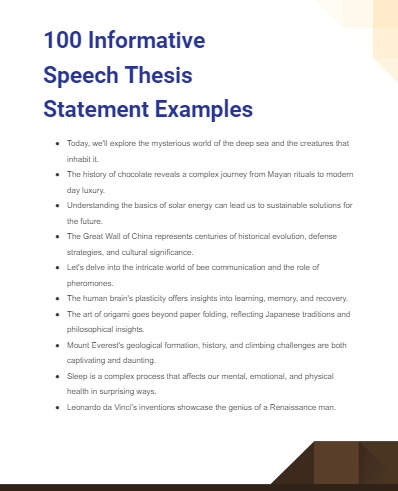
Size: 173 KB
- Today, we’ll explore the mysterious world of the deep sea and the creatures that inhabit it.
- The history of chocolate reveals a complex journey from Mayan rituals to modern day luxury.
- Understanding the basics of solar energy can lead us to sustainable solutions for the future.
- The Great Wall of China represents centuries of historical evolution, defense strategies, and cultural significance.
- Let’s delve into the intricate world of bee communication and the role of pheromones.
- The human brain’s plasticity offers insights into learning, memory, and recovery.
- The art of origami goes beyond paper folding, reflecting Japanese traditions and philosophical insights.
- Mount Everest’s geological formation, history, and climbing challenges are both captivating and daunting.
- Sleep is a complex process that affects our mental, emotional, and physical health in surprising ways.
- Leonardo da Vinci’s inventions showcase the genius of a Renaissance man.
- The process of wine-making, from grape to glass, combines art and science.
- By understanding the different waves of feminism, we can appreciate the evolution of gender rights.
- The history of the Olympics traces the evolution of human athleticism and global unity.
- Artificial intelligence’s rise and implications touch every facet of our modern lives.
- Delve into the mysterious culture and rituals of the Maasai tribe in East Africa.
- The Aurora Borealis, or Northern Lights, is a natural wonder driven by Earth’s magnetism.
- The evolution of the internet has transformed global communication, commerce, and culture.
- The Silk Road was more than a trade route; it was a bridge between cultures and epochs.
- The health benefits of meditation extend beyond relaxation, influencing brain structure and function.
- Exploring the dynamics of black holes uncovers the universe’s enigmatic phenomena.
- The ancient pyramids of Egypt tell tales of pharaohs, engineers, and a civilization ahead of its time.
- Yoga, beyond flexibility, promotes holistic health and spiritual growth.
- The migration patterns of monarch butterflies are one of nature’s most astonishing journeys.
- Unpacking the ethical implications of cloning gives insights into the future of biotechnology.
- The life cycle of a star reveals the universe’s beauty, complexity, and constant change.
- From farm to cup, the journey of coffee beans impacts economies, cultures, and your morning ritual.
- The Renaissance era: an explosion of art, science, and thought that shaped the modern world.
- The complexities of the human immune system defend us against microscopic invaders daily.
- Antarctica’s ecosystem is a fragile balance of life, adapting to the planet’s harshest conditions.
- The Titanic’s tragic voyage remains a lesson in hubris, safety, and fate.
- Let’s understand the intricacies of quantum mechanics and its revolution in modern physics.
- Delve into the world of paleontology and the mysteries of dinosaur existence.
- Sign languages around the world are rich, diverse modes of communication beyond spoken words.
- The world of dreams: decoding symbols, understanding stages, and their impact on our psyche.
- The Wright brothers’ journey was a testament to innovation, persistence, and the human spirit.
- The evolution of musical genres reflects societal changes, technological advancements, and cultural blends.
- Samurai warriors embody the ethos, discipline, and martial traditions of feudal Japan.
- The three states of matter offer a basic understanding of the universe’s physical essence.
- The Hubble Space Telescope has revolutionized our perception of the universe and our place within it.
- Journey through the rich tapestry of African tribal cultures, traditions, and histories.
- The concept of time travel, while popular in fiction, presents scientific and philosophical challenges.
- Explore the world of forensic science and its pivotal role in modern criminal justice.
- Delve into the world of cryptocurrencies, their workings, and their potential to redefine finance.
- The linguistic diversity of the Indian subcontinent showcases a mosaic of cultures, histories, and beliefs.
- The process of photosynthesis is nature’s way of converting light into life.
- The mysteries of the Bermuda Triangle have intrigued scientists, historians, and travelers alike.
- Uncover the importance and workings of vaccines in combating infectious diseases.
- The Eiffel Tower is more than an icon; it’s a testament to engineering and cultural symbolism.
- Delving into the myths, facts, and history of the majestic white wolves of the Arctic.
- The cultural, economic, and culinary significance of rice in global civilizations.
- Discover the beauty, function, and preservation of coral reefs, the oceans’ rainforests.
- The enigma of Stonehenge reflects ancient engineering, astronomical knowledge, and cultural rituals.
- Human memory is a complex interplay of neurons, experiences, and emotions.
- The history of jazz music: its roots, evolution, and impact on modern music genres.
- The incredible world of bioluminescence in deep-sea creatures.
- The philosophy and practices of Buddhism offer a path to enlightenment and inner peace.
- The Big Bang Theory unravels the universe’s origin, expansion, and eventual fate.
- Examine the rich history, culture, and significance of Native American tribes.
- The formation and importance of wetlands in maintaining global ecological balance.
- The metamorphosis process in butterflies: a dance of genes, hormones, and time.
- Delve into the wonders of the human genome and the secrets it holds about our evolution.
- The history and future of space exploration: from the moon landings to Mars missions.
- Discover the dynamic world of volcanoes, their formation, eruption, and influence on ecosystems.
- The French Revolution: its causes, timeline, and lasting impacts on global politics.
- Breaking down the science and art behind architectural marvels across history.
- The multifaceted world of the Amazon rainforest: its biodiversity, tribes, and conservation challenges.
- The principles and practices of sustainable farming in modern agriculture.
- Decoding the mysteries of the ancient Indus Valley Civilization.
- The art of bonsai: a journey of patience, aesthetics, and nature’s miniaturization.
- The Second World War: its origins, major events, and lasting global implications.
- The water cycle: nature’s way of sustaining life on Earth.
- Understanding autism: its spectrum, challenges, and societal implications.
- The cultural, historical, and spiritual significance of the holy city of Jerusalem.
- The physics and thrill of skydiving: conquering gravity and fear.
- The impact of the printing press on literature, religion, and the dissemination of knowledge.
- Delve into the intriguing world of espionage: its history, techniques, and impact on geopolitics.
- The cinematic evolution of Hollywood: from silent films to digital masterpieces.
- The profound impact of the Harlem Renaissance on art, literature, and black consciousness.
- The fascinating science behind earthquakes and our quest to predict them.
- The challenges, resilience, and beauty of life in the world’s deserts.
- The role and significance of the United Nations in global peace and diplomacy.
- The fashion revolutions of the 20th century and their socio-cultural impacts.
- Journey through the intricate and diverse world of spiders.
- The principles and history of the art of storytelling across civilizations.
- The enigma and allure of the Mona Lisa: beyond the smile and into da Vinci’s world.
- The magic of magnetism: its principles, applications, and mysteries.
- The impact of social media on society: communication, psychology, and privacy concerns.
- The mysteries and significance of the Dead Sea Scrolls in biblical research.
- The innovations and challenges of deep-sea exploration.
- Explore the evolution, beauty, and significance of Japanese tea ceremonies.
- The majestic world of eagles: species, habitats, and their role in ecosystems.
- The cultural and historical significance of ancient Greek theater.
- Dive into the art and techniques of cinematography in filmmaking.
- The complex history and geopolitics of the Panama Canal.
- The practice and significance of animal migration across species and ecosystems.
- The legacy and lessons of the Roman Empire.
- The beauty, challenges, and adaptations of alpine flora and fauna.
- The history, techniques, and significance of mural painting across cultures.
- The science and wonder of rainbows: from mythologies to optics.
- Discover the significance and celebrations of Diwali, the festival of lights.
Informative Speech Thesis Statement Examples for Introduction
An introductory informative speech thesis statement sets the stage, creating intrigue or establishing the context for the topic that follows. It lays the groundwork for what listeners can anticipate.
- Let’s embark on a journey through the ages, exploring the timeless allure of ancient civilizations.
- As we unravel the secrets of the universe, we begin with its most mysterious element: dark matter.
- Today, let’s understand the fabric of our global economy and the threads that weave it together.
- Venturing into the digital realm, we’ll discover the evolution and impact of social media on human connections.
- Set sail with me to explore the enigmatic world of lost cities submerged beneath the seas.
- Journeying back in time, we delve into the age of chivalry and the knights of old.
- Let us embark on an odyssey into the intricate realm of modern art and its diverse interpretations.
- Today, we set foot in the mesmerizing world of optical illusions and the psychology behind them.
- Navigating through the labyrinth of the human mind, we begin with dreams and their interpretations.
- As we chart our course today, let’s explore the unsung heroes behind history’s greatest discoveries.
Informative Speech Thesis Statement Examples for Graduation
Graduation speeches are pivotal moments, focusing on accomplishments, transition, and the journey ahead. A concise thesis statement should resonate with the gravity of the milestone.
- Today, we celebrate not just the culmination of years of hard work but the dawn of new beginnings.
- Graduation is a testament to perseverance, growth, and the dreams we dared to chase.
- We stand on the threshold of a new era, armed with knowledge, experiences, and ambitions.
- Together, we’ve climbed mountains of challenges, and today, we pause to admire the view.
- This graduation isn’t an endpoint but a launching pad for dreams yet to be realized.
- Through shared challenges and achievements, we’ve woven a tapestry of memories and aspirations.
- Today, as we close this chapter, we eagerly await the stories we’re destined to write.
- Graduation is a reflection of past endeavors and the beacon guiding our future journeys.
- As we don the cap and gown, we embrace the responsibilities and promises of tomorrow.
- This ceremony is a tribute to our resilience, aspirations, and the legacy we’re beginning to build.
Informative Speech Thesis Statement Examples For Autism
Autism speeches inform and spread awareness. The thesis should be insightful, compassionate, and devoid of any stereotypes.
- Autism, in its spectrum, paints a vivid tapestry of diverse experiences and unique strengths.
- Delving into autism, we discover not just challenges but unparalleled potential and perspectives.
- Unpacking the world of autism offers a glimpse into diverse minds shaping our world uniquely.
- Autism is not a limitation but a different lens through which the world is perceived.
- Through understanding autism, we pave the way for inclusivity, appreciation, and holistic growth.
- Autism, in its essence, challenges societal norms, urging us to redefine success and potential.
- Embracing the autistic community is embracing diversity, creativity, and the myriad ways of being human.
- Navigating the realm of autism, we find tales of resilience, innovation, and boundless spirit.
- Autism stands as a testament to human neurodiversity and the endless forms of intelligence.
- In the heart of autism lies the profound message of acceptance, understanding, and unbridled potential.
Informative Speech Thesis Statement Examples on Depression
When discussing depression, the thesis should be sensitive, informed, and aimed at eliminating stigma while spreading awareness.
- Depression, often silent, is a profound emotional experience that impacts countless lives globally.
- Delving into the depths of depression, we uncover its nuances, challenges, and paths to healing.
- Today, we shine a light on the shadows of depression, fostering understanding and empathy.
- Depression, beyond just a mood, is a complex interplay of biology, environment, and experiences.
- Recognizing and addressing depression is pivotal to building a compassionate and resilient society.
- In understanding depression, we equip ourselves with tools for empathy, intervention, and support.
- Depression, while daunting, also presents stories of strength, recovery, and hope.
- Through the lens of depression, we see the urgent need for mental health advocacy and education.
- Navigating the intricate world of depression helps dispel myths and foster genuine understanding.
- As we unravel the fabric of depression, we realize its universality and the importance of collective support.
Informative Speech Thesis Statement Examples on Life
Life, in its vastness, offers endless topics. A thesis on life should be profound, insightful, and universally resonant.
- Life, in its ebb and flow, presents a mosaic of experiences, challenges, and joys.
- Delving into the journey of life, we find lessons in the most unexpected moments.
- Life, with its unpredictable twists, teaches us resilience, adaptability, and the value of time.
- Through life’s lens, we appreciate the transient beauty of moments, relationships, and dreams.
- Life’s tapestry is woven with threads of memories, decisions, and the pursuit of purpose.
- Navigating the terrain of life, we encounter peaks of joy and valleys of introspection.
- Life’s rhythm is a dance of challenges met, lessons learned, and love discovered.
- Embracing life means acknowledging its imperfections, uncertainties, and boundless potentials.
- Life is a rich canvas, painted with choices, experiences, and the colors of emotions.
- In the vast expanse of life, we find the significance of connections, growth, and self-awareness.
Informative Speech Thesis Statement Examples Conclusion
Conclusion thesis statements wrap up the essence of the speech, leaving listeners with poignant thoughts or a call to action.
- As we journeyed through the annals of history, we’re reminded of the footprints we’re destined to leave.
- Having delved deep into the human psyche, we come away enlightened, empowered, and introspective.
- As our exploration concludes, let’s carry forward the knowledge, empathy, and drive to make a difference.
- Wrapping up our journey, we realize that every end is but a new beginning in disguise.
- As we draw the curtains, the lessons imbibed urge us to reflect, act, and evolve.
- In conclusion, the tapestry we’ve woven today serves as a testament to our collective potential.
- As our discourse comes to an end, let’s pledge to be torchbearers of change, understanding, and progress.
- Concluding today’s journey, we’re left with insights, questions, and a renewed sense of purpose.
- As we wrap up, the stories shared serve as beacons, illuminating our paths and choices.
- In the final note, let’s carry the essence of today’s exploration, making it a catalyst for growth and understanding.
What is a good thesis statement for an informative essay?
A good thesis statement for an informative essay is a clear, concise declaration that presents the main point or argument of your essay. It informs the reader about the specific topic you will discuss without offering a personal opinion or taking a stance. The ideal thesis statement is:
- Specific: It should narrow down the subject so readers understand the essay’s scope.
- Arguable: Though it doesn’t express an opinion, it should still be something that might be disputed or clarified.
- Clear: It should be easily understandable without any ambiguity.
- Focused: The thesis should relate directly to the topic, ensuring it doesn’t stray into irrelevant areas.
- Brief: While it should encapsulate your main point, it shouldn’t be excessively long.
Example: “The process of photosynthesis in plants is crucial for converting carbon dioxide into oxygen, a transformation that sustains most life forms on Earth.”
Does an informative speech need a thesis?
Yes, an informative speech does need a thesis. The thesis acts as a compass for your audience, providing them with a clear understanding of what they will learn or gain from your speech. It sets the tone, focuses the content, and provides a roadmap for listeners to follow. An informative speech thesis helps the audience:
- Understand the Purpose: It clearly states what the speech will cover.
- Anticipate Content: It sets expectations for the type of information they will receive.
- Stay Engaged: By knowing the direction, listeners can follow along more easily and attentively.
- Retain Information: With a clear foundation laid by the thesis, the audience can more easily remember key takeaways.
How do you write an Informative speech thesis statement? – Step by Step Guide
Crafting a strong and effective specific thesis statement for an informative speech is vital to convey the essence of your message clearly. Here’s a comprehensive step-by-step guide to help you through the process:
- Select a Suitable Topic: Start with a subject that is engaging and you’re knowledgeable about. This will give your thesis authenticity and enthusiasm.
- Refine Your Topic: A broad subject can be overwhelming for both the speaker and the audience. Narrow it down to a specific aspect or angle that you want to focus on.
- Conduct Preliminary Research: Even if you’re familiar with the subject, conduct some research to ensure you have updated and factual information. This will give your thesis credibility.
- Determine the Main Points: From your research and knowledge, deduce the primary points or messages you wish to convey to your audience.
- Formulate a Draft Thesis: Using your main points, write a draft of your thesis statement. This doesn’t have to be perfect; it’s just a starting point.
- Keep it Clear and Concise: Your thesis should be easily understandable. Avoid jargon and complex words unless they are crucial and you plan to explain them during your speech.
- Ensure Objectivity: An informative thesis aims to educate, not to persuade. Keep it neutral and avoid any personal bias.
- Test for Specificity: Your thesis should be specific enough to give your audience a clear idea of what to expect, but broad enough to encompass the main idea of your speech.
- Seek Feedback: Share your draft thesis with friends, colleagues, or mentors. Their perspectives might offer valuable insights or point out aspects you hadn’t considered.
- Revise and Refine: Based on feedback and further reflection, refine your thesis. Ensure it’s concise, specific, and clearly conveys the main idea of your speech.
- Practice it Aloud: Say your thesis statement out loud a few times. This helps you ensure it flows well and can be easily understood when spoken.
- Align with Content: As you develop the content of your speech, revisit your thesis to ensure it remains consistent with the information you’re presenting. Adjust if necessary.
- Finalize: Once you’re satisfied, finalize your thesis statement. It should be a strong and clear representation of what your audience can expect from your speech.
Remember, your thesis is the foundation of your informative speech. It sets the stage for everything that follows, so taking the time to craft it meticulously is crucial for the effectiveness of your speech.
Tips for Writing an Informative Speech Thesis Statement
- Stay Objective: Avoid personal biases. Your goal is to inform, not persuade.
- Be Specific: General statements can disengage your audience. Specificity grabs attention.
- Limit Your Scope: Don’t try to cover too much. Stick to what’s essential to avoid overwhelming your audience.
- Prioritize Clarity: Use simple, direct language. Avoid jargon unless it’s pertinent and you plan to explain it.
- Test It Out: Before finalizing, say your thesis out loud. This will help identify any awkward phrasings.
- Stay Relevant: Make sure your thesis relates directly to the rest of your speech.
- Avoid Questions: Your thesis should be a statement, not a question.
- Revise as Needed: As you flesh out your speech, revisit your thesis to ensure it still aligns.
- Stay Consistent: The tone and style of your thesis should match the rest of your speech.
- Seek Inspiration: Listen to other informative speeches or read essays to see how experts craft their thesis statements.
Remember, your thesis statement is the anchor of your speech. Invest time in crafting one that is clear, compelling, and informative. You should also take a look at our final thesis statement .
Informative Speech Generator
Text prompt
- Instructive
- Professional
Create an Informative Speech Thesis Statement on the history of the internet
Write an Informative Speech Thesis Statement for a talk on the evolution of human rights

14 Crafting a Thesis Statement
Learning Objectives
- Craft a thesis statement that is clear, concise, and declarative.
- Narrow your topic based on your thesis statement and consider the ways that your main points will support the thesis.
Crafting a Thesis Statement
A thesis statement is a short, declarative sentence that states the purpose, intent, or main idea of a speech. A strong, clear thesis statement is very valuable within an introduction because it lays out the basic goal of the entire speech. We strongly believe that it is worthwhile to invest some time in framing and writing a good thesis statement. You may even want to write your thesis statement before you even begin conducting research for your speech. While you may end up rewriting your thesis statement later, having a clear idea of your purpose, intent, or main idea before you start searching for research will help you focus on the most appropriate material. To help us understand thesis statements, we will first explore their basic functions and then discuss how to write a thesis statement.
Basic Functions of a Thesis Statement
A thesis statement helps your audience by letting them know, clearly and concisely, what you are going to talk about. A strong thesis statement will allow your reader to understand the central message of your speech. You will want to be as specific as possible. A thesis statement for informative speaking should be a declarative statement that is clear and concise; it will tell the audience what to expect in your speech. For persuasive speaking, a thesis statement should have a narrow focus and should be arguable, there must be an argument to explore within the speech. The exploration piece will come with research, but we will discuss that in the main points. For now, you will need to consider your specific purpose and how this relates directly to what you want to tell this audience. Remember, no matter if your general purpose is to inform or persuade, your thesis will be a declarative statement that reflects your purpose.
How to Write a Thesis Statement
Now that we’ve looked at why a thesis statement is crucial in a speech, let’s switch gears and talk about how we go about writing a solid thesis statement. A thesis statement is related to the general and specific purposes of a speech.
Once you have chosen your topic and determined your purpose, you will need to make sure your topic is narrow. One of the hardest parts of writing a thesis statement is narrowing a speech from a broad topic to one that can be easily covered during a five- to seven-minute speech. While five to seven minutes may sound like a long time for new public speakers, the time flies by very quickly when you are speaking. You can easily run out of time if your topic is too broad. To ascertain if your topic is narrow enough for a specific time frame, ask yourself three questions.
Is your speech topic a broad overgeneralization of a topic?
Overgeneralization occurs when we classify everyone in a specific group as having a specific characteristic. For example, a speaker’s thesis statement that “all members of the National Council of La Raza are militant” is an overgeneralization of all members of the organization. Furthermore, a speaker would have to correctly demonstrate that all members of the organization are militant for the thesis statement to be proven, which is a very difficult task since the National Council of La Raza consists of millions of Hispanic Americans. A more appropriate thesis related to this topic could be, “Since the creation of the National Council of La Raza [NCLR] in 1968, the NCLR has become increasingly militant in addressing the causes of Hispanics in the United States.”
Is your speech’s topic one clear topic or multiple topics?
A strong thesis statement consists of only a single topic. The following is an example of a thesis statement that contains too many topics: “Medical marijuana, prostitution, and Women’s Equal Rights Amendment should all be legalized in the United States.” Not only are all three fairly broad, but you also have three completely unrelated topics thrown into a single thesis statement. Instead of a thesis statement that has multiple topics, limit yourself to only one topic. Here’s an example of a thesis statement examining only one topic: Ratifying the Women’s Equal Rights Amendment as equal citizens under the United States law would protect women by requiring state and federal law to engage in equitable freedoms among the sexes.
Does the topic have direction?
If your basic topic is too broad, you will never have a solid thesis statement or a coherent speech. For example, if you start off with the topic “Barack Obama is a role model for everyone,” what do you mean by this statement? Do you think President Obama is a role model because of his dedication to civic service? Do you think he’s a role model because he’s a good basketball player? Do you think he’s a good role model because he’s an excellent public speaker? When your topic is too broad, almost anything can become part of the topic. This ultimately leads to a lack of direction and coherence within the speech itself. To make a cleaner topic, a speaker needs to narrow her or his topic to one specific area. For example, you may want to examine why President Obama is a good public speaker.
Put Your Topic into a Declarative Sentence
You wrote your general and specific purpose. Use this information to guide your thesis statement. If you wrote a clear purpose, it will be easy to turn this into a declarative statement.
General purpose: To inform
Specific purpose: To inform my audience about the lyricism of former President Barack Obama’s presentation skills.
Your thesis statement needs to be a declarative statement. This means it needs to actually state something. If a speaker says, “I am going to talk to you about the effects of social media,” this tells you nothing about the speech content. Are the effects positive? Are they negative? Are they both? We don’t know. This sentence is an announcement, not a thesis statement. A declarative statement clearly states the message of your speech.
For example, you could turn the topic of President Obama’s public speaking skills into the following sentence: “Because of his unique sense of lyricism and his well-developed presentational skills, President Barack Obama is a modern symbol of the power of public speaking.” Or you could state, “Socal media has both positive and negative effects on users.”
Adding your Argument, Viewpoint, or Opinion
If your topic is informative, your job is to make sure that the thesis statement is nonargumentative and focuses on facts. For example, in the preceding thesis statement, we have a couple of opinion-oriented terms that should be avoided for informative speeches: “unique sense,” “well-developed,” and “power.” All three of these terms are laced with an individual’s opinion, which is fine for a persuasive speech but not for an informative speech. For informative speeches, the goal of a thesis statement is to explain what the speech will be informing the audience about, not attempting to add the speaker’s opinion about the speech’s topic. For an informative speech, you could rewrite the thesis statement to read, “Barack Obama’s use of lyricism in his speech, ‘A World That Stands as One,’ delivered July 2008 in Berlin demonstrates exceptional use of rhetorical strategies.
On the other hand, if your topic is persuasive, you want to make sure that your argument, viewpoint, or opinion is clearly indicated within the thesis statement. If you are going to argue that Barack Obama is a great speaker, then you should set up this argument within your thesis statement.
For example, you could turn the topic of President Obama’s public speaking skills into the following sentence: “Because of his unique sense of lyricism and his well-developed presentational skills, President Barack Obama is a modern symbol of the power of public speaking.” Once you have a clear topic sentence, you can start tweaking the thesis statement to help set up the purpose of your speech.
Thesis Checklist
Once you have written a first draft of your thesis statement, you’re probably going to end up revising your thesis statement a number of times prior to delivering your actual speech. A thesis statement is something that is constantly tweaked until the speech is given. As your speech develops, often your thesis will need to be rewritten to whatever direction the speech itself has taken. We often start with a speech going in one direction, and find out through our research that we should have gone in a different direction. When you think you finally have a thesis statement that is good to go for your speech, take a second and make sure it adheres to the criteria shown below.
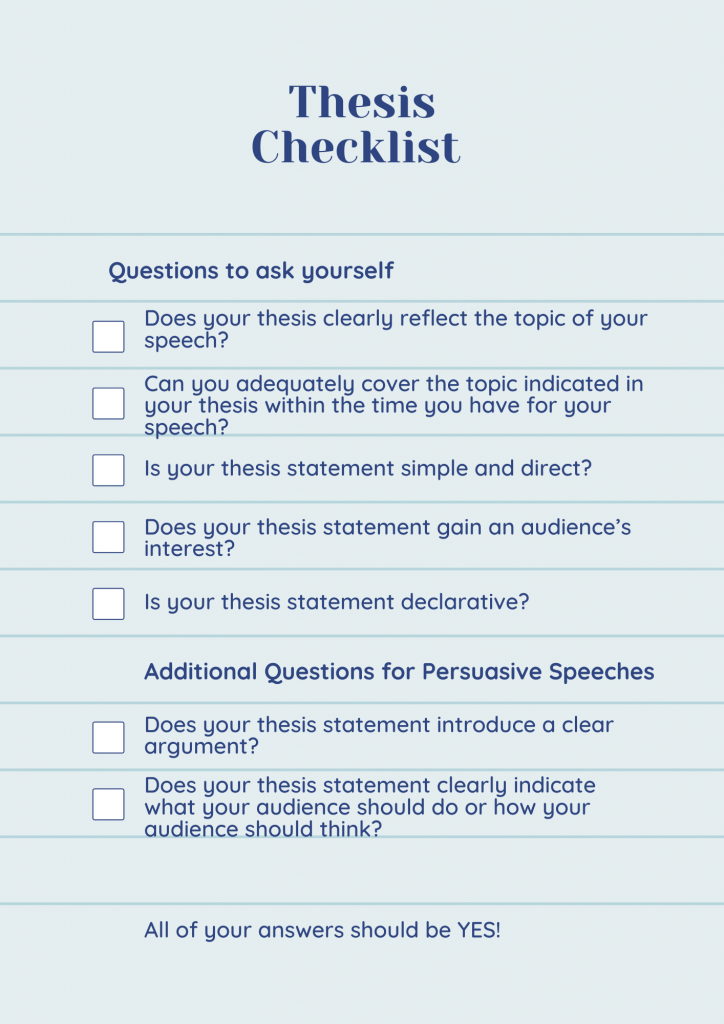
Preview of Speech
The preview, as stated in the introduction portion of our readings, reminds us that we will need to let the audience know what the main points in our speech will be. You will want to follow the thesis with the preview of your speech. Your preview will allow the audience to follow your main points in a sequential manner. Spoiler alert: The preview when stated out loud will remind you of main point 1, main point 2, and main point 3 (etc. if you have more or less main points). It is a built in memory card!
For Future Reference | How to organize this in an outline |
Introduction
Attention Getter: Background information: Credibility: Thesis: Preview:
Key Takeaways
Introductions are foundational to an effective public speech.
- A thesis statement is instrumental to a speech that is well-developed and supported.
- Be sure that you are spending enough time brainstorming strong attention getters and considering your audience’s goal(s) for the introduction.
- A strong thesis will allow you to follow a roadmap throughout the rest of your speech: it is worth spending the extra time to ensure you have a strong thesis statement.
Stand up, Speak out by University of Minnesota is licensed under a Creative Commons Attribution-NonCommercial-ShareAlike 4.0 International License , except where otherwise noted.
Public Speaking Copyright © by Dr. Layne Goodman; Amber Green, M.A.; and Various is licensed under a Creative Commons Attribution-NonCommercial-ShareAlike 4.0 International License , except where otherwise noted.
Share This Book
Home / Guides / Writing Guides / Parts of a Paper / How to Write a Strong Thesis Statement
How to Write a Strong Thesis Statement
A thesis can be found in many places—a debate speech, a lawyer’s closing argument, even an advertisement. But the most common place for a thesis statement (and probably why you’re reading this article) is in an essay.
Whether you’re writing an argumentative paper, an informative essay, or a compare/contrast statement, you need a thesis. Without a thesis, your argument falls flat and your information is unfocused. Since a thesis is so important, it’s probably a good idea to look at some tips on how to put together a strong one.
Guide Overview
What is a “thesis statement” anyway.
- 2 categories of thesis statements: informative and persuasive
- 2 styles of thesis statements
- Formula for a strong argumentative thesis
- The qualities of a solid thesis statement (video)
You may have heard of something called a “thesis.” It’s what seniors commonly refer to as their final paper before graduation. That’s not what we’re talking about here. That type of thesis is a long, well-written paper that takes years to piece together.
Instead, we’re talking about a single sentence that ties together the main idea of any argument . In the context of student essays, it’s a statement that summarizes your topic and declares your position on it. This sentence can tell a reader whether your essay is something they want to read.
2 Categories of Thesis Statements: Informative and Persuasive
Just as there are different types of essays, there are different types of thesis statements. The thesis should match the essay.
For example, with an informative essay, you should compose an informative thesis (rather than argumentative). You want to declare your intentions in this essay and guide the reader to the conclusion that you reach.
To make a peanut butter and jelly sandwich, you must procure the ingredients, find a knife, and spread the condiments.
This thesis showed the reader the topic (a type of sandwich) and the direction the essay will take (describing how the sandwich is made).
Most other types of essays, whether compare/contrast, argumentative, or narrative, have thesis statements that take a position and argue it. In other words, unless your purpose is simply to inform, your thesis is considered persuasive. A persuasive thesis usually contains an opinion and the reason why your opinion is true.
Peanut butter and jelly sandwiches are the best type of sandwich because they are versatile, easy to make, and taste good.
In this persuasive thesis statement, you see that I state my opinion (the best type of sandwich), which means I have chosen a stance. Next, I explain that my opinion is correct with several key reasons. This persuasive type of thesis can be used in any essay that contains the writer’s opinion, including, as I mentioned above, compare/contrast essays, narrative essays, and so on.
2 Styles of Thesis Statements
Just as there are two different types of thesis statements (informative and persuasive), there are two basic styles you can use.
The first style uses a list of two or more points . This style of thesis is perfect for a brief essay that contains only two or three body paragraphs. This basic five-paragraph essay is typical of middle and high school assignments.
C.S. Lewis’s Chronicles of Narnia series is one of the richest works of the 20th century because it offers an escape from reality, teaches readers to have faith even when they don’t understand, and contains a host of vibrant characters.
In the above persuasive thesis, you can see my opinion about Narnia followed by three clear reasons. This thesis is perfect for setting up a tidy five-paragraph essay.
In college, five paragraph essays become few and far between as essay length gets longer. Can you imagine having only five paragraphs in a six-page paper? For a longer essay, you need a thesis statement that is more versatile. Instead of listing two or three distinct points, a thesis can list one overarching point that all body paragraphs tie into.
Good vs. evil is the main theme of Lewis’s Narnia series, as is made clear through the struggles the main characters face in each book.
In this thesis, I have made a claim about the theme in Narnia followed by my reasoning. The broader scope of this thesis allows me to write about each of the series’ seven novels. I am no longer limited in how many body paragraphs I can logically use.
Formula for a Strong Argumentative Thesis
One thing I find that is helpful for students is having a clear template. While students rarely end up with a thesis that follows this exact wording, the following template creates a good starting point:
___________ is true because of ___________, ___________, and ___________.
Conversely, the formula for a thesis with only one point might follow this template:
___________________ is true because of _____________________.
Students usually end up using different terminology than simply “because,” but having a template is always helpful to get the creative juices flowing.
The Qualities of a Solid Thesis Statement
When composing a thesis, you must consider not only the format, but other qualities like length, position in the essay, and how strong the argument is.
Length: A thesis statement can be short or long, depending on how many points it mentions. Typically, however, it is only one concise sentence. It does contain at least two clauses, usually an independent clause (the opinion) and a dependent clause (the reasons). You probably should aim for a single sentence that is at least two lines, or about 30 to 40 words long.
Position: A thesis statement always belongs at the beginning of an essay. This is because it is a sentence that tells the reader what the writer is going to discuss. Teachers will have different preferences for the precise location of the thesis, but a good rule of thumb is in the introduction paragraph, within the last two or three sentences.
Strength: Finally, for a persuasive thesis to be strong, it needs to be arguable. This means that the statement is not obvious, and it is not something that everyone agrees is true.
Example of weak thesis:
Peanut butter and jelly sandwiches are easy to make because it just takes three ingredients.
Most people would agree that PB&J is one of the easiest sandwiches in the American lunch repertoire.
Example of a stronger thesis:
Peanut butter and jelly sandwiches are fun to eat because they always slide around.
This is more arguable because there are plenty of folks who might think a PB&J is messy or slimy rather than fun.
Composing a thesis statement does take a bit more thought than many other parts of an essay. However, because a thesis statement can contain an entire argument in just a few words, it is worth taking the extra time to compose this sentence. It can direct your research and your argument so that your essay is tight, focused, and makes readers think.
EasyBib Writing Resources
Writing a paper.
- Academic Essay
- Argumentative Essay
- College Admissions Essay
- Expository Essay
- Persuasive Essay
- Research Paper
- Thesis Statement
- Writing a Conclusion
- Writing an Introduction
- Writing an Outline
- Writing a Summary
EasyBib Plus Features
- Citation Generator
- Essay Checker
- Expert Check Proofreader
- Grammar Checker
- Paraphrasing Tools
Plagiarism Checker
- Spell Checker
How useful was this post?
Click on a star to rate it!
We are sorry that this post was not useful for you!
Let us improve this post!
Tell us how we can improve this post?
Grammar and Plagiarism Checkers
Grammar Basics
Plagiarism Basics
Writing Basics
Upload a paper to check for plagiarism against billions of sources and get advanced writing suggestions for clarity and style.
Get Started
Informative Speeches — Types, Topics, and Examples

What is an informative speech?
An informative speech uses descriptions, demonstrations, and strong detail to explain a person, place, or subject. An informative speech makes a complex topic easier to understand and focuses on delivering information, rather than providing a persuasive argument.
Types of informative speeches
The most common types of informative speeches are definition, explanation, description, and demonstration.

A definition speech explains a concept, theory, or philosophy about which the audience knows little. The purpose of the speech is to inform the audience so they understand the main aspects of the subject matter.
An explanatory speech presents information on the state of a given topic. The purpose is to provide a specific viewpoint on the chosen subject. Speakers typically incorporate a visual of data and/or statistics.
The speaker of a descriptive speech provides audiences with a detailed and vivid description of an activity, person, place, or object using elaborate imagery to make the subject matter memorable.
A demonstrative speech explains how to perform a particular task or carry out a process. These speeches often demonstrate the following:
How to do something
How to make something
How to fix something
How something works

How to write an informative speech
Regardless of the type, every informative speech should include an introduction, a hook, background information, a thesis, the main points, and a conclusion.
Introduction
An attention grabber or hook draws in the audience and sets the tone for the speech. The technique the speaker uses should reflect the subject matter in some way (i.e., if the topic is serious in nature, do not open with a joke). Therefore, when choosing an attention grabber, consider the following:
What’s the topic of the speech?
What’s the occasion?
Who’s the audience?
What’s the purpose of the speech?

Common Attention Grabbers (Hooks)
Ask a question that allows the audience to respond in a non-verbal way (e.g., a poll question where they can simply raise their hands) or ask a rhetorical question that makes the audience think of the topic in a certain way yet requires no response.
Incorporate a well-known quote that introduces the topic. Using the words of a celebrated individual gives credibility and authority to the information in the speech.
Offer a startling statement or information about the topic, which is typically done using data or statistics. The statement should surprise the audience in some way.
Provide a brief anecdote that relates to the topic in some way.
Present a “what if” scenario that connects to the subject matter of the speech.
Identify the importance of the speech’s topic.
Starting a speech with a humorous statement often makes the audience more comfortable with the speaker.
Include any background information pertinent to the topic that the audience needs to know to understand the speech in its entirety.
The thesis statement shares the central purpose of the speech.
Demonstrate

Preview the main ideas that will help accomplish the central purpose. Typically, informational speeches will have an average of three main ideas.
Body paragraphs
Apply the following to each main idea (body) :
Identify the main idea ( NOTE: The main points of a demonstration speech would be the individual steps.)
Provide evidence to support the main idea
Explain how the evidence supports the main idea/central purpose
Transition to the next main idea

Review or restate the thesis and the main points presented throughout the speech.
Much like the attention grabber, the closing statement should interest the audience. Some of the more common techniques include a challenge, a rhetorical question, or restating relevant information:
Provide the audience with a challenge or call to action to apply the presented information to real life.
Detail the benefit of the information.
Close with an anecdote or brief story that illustrates the main points.
Leave the audience with a rhetorical question to ponder after the speech has concluded.
Detail the relevance of the presented information.

Before speech writing, brainstorm a list of informative speech topic ideas. The right topic depends on the type of speech, but good topics can range from video games to disabilities and electric cars to healthcare and mental health.
Informative speech topics
Some common informative essay topics for each type of informational speech include the following:
Informative speech examples
The following list identifies famous informational speeches:
“Duties of American Citizenship” by Theodore Roosevelt
“Duty, Honor, Country” by General Douglas MacArthur
“Strength and Dignity” by Theodore Roosevelt
Explanation
“Give Me Liberty or Give Me Death” by Patrick Henry
“The Decision to Go to the Moon” by John F. Kennedy
“We Shall Fight on the Beaches” by Winston Churchill
Description
“I Have a Dream” by Martin Luther King, Jr.
“Pearl Harbor Address” by Franklin Delano Roosevelt
“Luckiest Man” by Lou Gehrig
Demonstration
The Way to Cook with Julia Child
This Old House with Bob Vila
Bill Nye the Science Guy with Bill Nye
My Speech Class
Public Speaking Tips & Speech Topics
Informative Speech Outline – Template & Examples

Jim Peterson has over 20 years experience on speech writing. He wrote over 300 free speech topic ideas and how-to guides for any kind of public speaking and speech writing assignments at My Speech Class.

Informative speeches are used in our day-to-day lives without even noticing it, we use these speeches whenever we inform someone about a topic they didn’t have much knowledge on, whenever we give someone instructions on how to do something that they haven’t done before, whenever we tell someone about another person. Informative speaking is fairly new to the world of public speaking. Ancient philosophers like Aristotle, Cicero and, Quintilian envisioned public speaking as rhetoric, which is inherently persuasive.
In this article:
What is an Informative Speech?
Here are some ways to prepare for your speech, 1. develop support for your thesis, 2. write your introduction and conclusion, 3. deliver the speech, example of an informative speech outline.

An informative speech is designed to inform the audience about a certain topic of discussion and to provide more information. It is usually used to educate an audience on a particular topic of interest. The main goal of an informative speech is to provide enlightenment concerning a topic the audience knows nothing about. The main types of informative speeches are descriptive, explanatory, demonstrative, and definition speeches. The topics that are covered in an informative speech should help the audience understand the subject of interest better and help them remember what they learned later. The goal of an informative speech isn’t to persuade or sway the audience to the speaker’s point of view but instead to educate. The details need to be laid out to the audience so that they can make an educated decision or learn more about the subject that they are interested in.
It is important for the speaker to think about how they will present the information to the audience.
Informative Speech Preparation

When you are preparing your informative speech, your preparation is the key to a successful speech. Being able to carry your information across to the audience without any misunderstanding or misinterpretation is very important.
1. Choose Your Topic
Pick a topic where you will explain something, help people understand a certain subject, demonstrate how to use something.
2. Make a Thesis Statement
Think about what point you are trying to get across, What is the topic that you want to educate your audience on? “I will explain…” “I will demonstrate how to…” “I will present these findings…”
Can We Write Your Speech?
Get your audience blown away with help from a professional speechwriter. Free proofreading and copy-editing included.
3. Create Points That Support Your Thesis
Take a moment to think about what would support your thesis and take a moment to write the points down on a sheet of paper. Then, take a moment to elaborate on those points and support them.
Typical Organization for an Informative Speech:
How to Speech: 4 Key steps to doing what you are talking about.
Example: Step One: Clean the chicken of any unwanted feathers and giblets. Step Two: Spice the chicken and add stuffings. Step Three: Set oven to 425 degrees Fahrenheit. Step Four: Place chicken in the oven and cook for an hour.
History/ What Happened Speech: Points listing from the beginning to the latest events that you want to discuss in your speech.
Example: First, Harry met Sally. Second, Harry took Sally out to the roadhouse. Third, Harry and Sally started their courtship. Fourth, Harry and Sally moved in together and adopted a dog named Paco.
What is it Speech: Two to Four main points that discuss the key elements of your subject.
Example: First, there must be four wheels. Second, the car’s engine must be functioning. Third, the doors must be functional. Fourth, in order to get to your destination, the car’s steering has to be functional.
Explain it Speech: Two to Four main points that go through the key elements of the topic to explain it.
Example: Firstly, the car drives by the engine that powers it to move forward. Secondly, by the wheels that rotate in a forward or backward motion. Thirdly, the car’s engine is powered by gas which gives it the ability to function and essentially move the car.
Write down support for your points. Take some time to research your topic thoroughly. It is good to gather statistics, expert opinions, facts, and much more to make your speech unique and effective.
There are three main types of support you should use to strengthen your speech:
Interest supports.
Interest supports are used to increase the audience’s interest in the topic you are presenting.
- Personal experiences
- Interaction (e.g., Questions to the audience)

Evidence Supports
Evidence increases solid factual support in your speech. Examples of evidence supported are statistics, expert opinions, direct quotations. Studies, surveys, and facts.
Multimedia Aids
Multimedia aids such as posters with pictures and writing, DVDs, music or recordings on a stereo player, videotapes, and PowerPoint presentations.
Write your introduction. Provide a quick attention getter, state your thesis, elaborate on why it is important to you and your audience. It is expected that you preview your main points in the introduction by listing all your main points of discussion in your introduction.
Write your conclusion. Tie the speech together, build to a higher point and give it a sense of conclusion.
Practice your speech until you feel confident. Present your material as effectively as possible.
Informative Speech Outline

Creating an outline for an informative speech will help you organize your ideas and information to share with your audience in an effective manner. A well-planned outline will ensure that all the important information is included in your speech and ensure that you don’t wander off-topic.
Topic: This will be the title of your speech.
Purpose: To inform the audience about the topic.
Thesis: A theme statement that clearly describes the topic and points made in the presentation.
- Introduction
- Attention-grabbing opening statement
- Reason to listen to the speech
- Thesis statement
- Preview of points to be covered
- First main point
- First subpoint
- Supporting detail
- Second subpoint
- Second main point
- Third main point
- Restatement of main points
- Restatement of thesis
- Concluding remarks
When developing an outline, follow these rules to ensure a successful speech:
- Include one idea for every point, subpoint, or supporting detail.
- If there is one point, there must be a second point. If there is one supporting point, there should be a second supporting point.
- Be consistent. If you are using full sentences to describe points and subpoints, use full sentences throughout the outline. Ensure that the verb tense is consistent throughout your outline as well.
Informative Speech Outline Examples

Topic: Adoption
Purpose: To inform people about adoption
Thesis: Adoption is the act of transferring parental rights and duties to someone other than the adopted person’s biological parents. The number of children adopted each year by American families is an estimate only.
- What do Edgar Allan Poe, John Lennon, Steve Jobs, and Eleanor Roosevelt all have in common? They were all adopted. Adoption is the act of transferring parental rights and duties to someone other than the adopted person’s biological parents. The adoption process is lengthy, expensive, and varies from country to country and even state to state. Not only does adoption vary from state to state, but sometimes the adoption process even varies within regions of a state.
- Many children get adopted every year. No one knows how adoption works.
- Adoption is a life-changing event, not just for the children involved but also for every single family made whole through adoption.
- Adoption processes vary from place to place. Types of adoption. Benefits and detriments to adoption. Many children who are adopted have experienced neglect and abuse.
- Adoption processes vary from place to place.
- The adoption process varies from state to state.
- It is more expensive in certain states than in others.
- The amount of paperwork throughout the process also depends on the state legislature.
- The adoption process varies within a state.
- In certain states, the adoption process is different from one region to the next.
- The process is different depending on the child protection laws set in each region inside a state.
- Types of adoption
- There are different types of adoption.
- There is step-parent or other family member adoption
- There is also adoption across state lines
- The more traditional adoption types are commonly known.
- There is private adoption which is most commonly found throughout the U.S.
- Adoption through foster care is a good thing to try for first-time adopters.
- The adoption process is expensive.
- There are a lot of upfront expenses.
- You are subjected to adoption agency fees to help you find a suitable match for your family.
- You also have to pay to adopt the child you want to adopt.
- There are a lot of big expenses in terms of the child too.
- Readying a living space to suit a child’s wants and needs can be expensive.
- Many new expenses come to light like healthcare, school, etc.
- Adoption processes vary from state to state. There are many different types of adoption. Adoption can be expensive, so you have to ensure that you are financially capable of caring for another human being.
- Adoption is the act of transferring parental rights and duties to someone other than the adopted person’s biological parents. The number of children adopted each year by American families is an estimate only.
- Adoption is an absolutely life-changing adventure, but everyone needs to be more educated before walking into a demanding process. There will be many emotions, expenses, and frustration, but it truly is worth it in the end.
Topic: Snakebites and how they’re treated
Purpose: To inform the audience of the dangers of snakes and how to respond to being bitten by a snake.
Thesis: Snakebites are dangerous and could ultimately lead to loss of life if not acted upon correctly.
- Imagine that you and your friend are walking in the woods, one sunny day in the fall when leaves cover the ground. Suddenly, your friend accidentally steps on a snake and gets bitten.
- Your friend’s chance of survival depends on your knowledge of acting promptly and taking proper measures in this situation.
- Today I will inform you about three common poisonous snakes seen in our country and explain to you the effects of a snake bite.
- Three poisonous snakes. Effects of the snake’s venom. How to administer first aid in the event of a snake bite.
- Three poisonous snakes
- There are two types of Rattlesnakes.
- William Pinkston: Responsible for more deaths in this country.
- Western diamondback: found from Texas to Eastern California.
- Copperhead and Cottonmouth
- Before striking, it opens its mouth wide to reveal its white inside.
- That’s how it got its name.
- The effects of snake venom on the human body
- Hepatotoxic
- Destroys blood vessels and red blood cells.
- Deadly and fatal to the victim.
- It affects the optic nerves in the eyes, causing blindness.
- It affects the nerves controlling the respiratory muscles, causing suffocation and eventually leading to death if left untreated.
- How to administer first aid in the event of a snake bite.
- Immobilize the bitten area slightly lower than the heart.
- Apply a flat constricting band 2-4 inches above the bite.
- With a sterile scalpel or knife, make one incision that connects the fang marks.
- Squeeze venom gently from the incision with your fingers for 30 minutes.
- Get the victim to the hospital as soon as possible.
- Snake bites are dangerous and could ultimately lead to loss of life if not acted upon correctly.
- Snake bites are dangerous and could ultimately lead to loss of life if they are not cared for properly, and the victim doesn’t get the necessary treatment in time.
Informative speeches have one main goal: to inform the audience of a specific topic of interest. For you to have an effective and successful informative speech, it is important to do your research and draw up an informative speech outline. The speech outline ensures that you do not wander off topic or get carried away with one point.
If, on the other hand, you have to prepare persuasive speech, we have a guide on outlining and preparing for it the right way right here .
Avoid Any Awkward Silence With These 35+ Topics to Talk About
16 Tips to Help You Write Like a Pro
Leave a Comment
I accept the Privacy Policy
Reach out to us for sponsorship opportunities
Vivamus integer non suscipit taciti mus etiam at primis tempor sagittis euismod libero facilisi.
© 2024 My Speech Class
- Speech Crafting →
Public Speaking: Developing a Thesis Statement In a Speech

Understanding the purpose of a thesis statement in a speech
Diving headfirst into the world of public speaking, it’s essential to grasp the role of a thesis statement in your speech. Think of it as encapsulating the soul of your speech within one or two sentences.
It’s the declarative sentence that broadcasts your intent and main idea to captivate audiences from start to finish. More than just a preview, an effective thesis statement acts as a roadmap guiding listeners through your thought process.
Giving them that quick glimpse into what they can anticipate helps keep their attention locked in.
As you craft this central hub of information, understand that its purpose is not limited to informing alone—it could be meant also to persuade or entertain based on what you aim for with your general purpose statement.
This clear focus is pivotal—it shapes each aspect of your talk, easing understanding for the audience while setting basic goals for yourself throughout the speech-making journey. So whether you are rallying rapturous applause or instigating intellectual insight, remember—your thesis statement holds power like none other! Its clarity and strength can transition between being valuable sidekicks in introductions towards becoming triumphant heroes by concluding lines.
Identifying the main idea to develop a thesis statement
In crafting a compelling speech, identifying the main idea to develop a thesis statement acts as your compass. This process is a crucial step in speech preparation that steers you towards specific purpose.
Think of your central idea as the seed from which all other elements in your speech will grow.
To pinpoint it, start by brainstorming broad topics that interest or inspire you. From this list, choose one concept that stands out and begin to narrow it down into more specific points. It’s these refined ideas that form the heart of your thesis statement — essentially acting as signposts leading the audience through your narrative journey.
Crafting an effective thesis statement requires clarity and precision. This means keeping it concise without sacrificing substance—a tricky balancing act even for public speaking veterans! The payoff though? A well-developed thesis statement provides structure to amplifying your central idea and guiding listeners smoothly from point A to B.
It’s worth noting here: just like every speaker has their own unique style, there are multiple ways of structuring a thesis statement too. But no matter how you shape yours, ensuring it resonates with both your overarching message and audience tastes will help cement its effectiveness within your broader presentation context.
Analyzing the audience to tailor the thesis statement
Audience analysis is a crucial first step for every public speaker. This process involves adapting the message to meet the audience’s needs, a thoughtful approach that considers cultural diversity and ensures clear communication.
Adapting your speech to resonate with your target audience’s interests, level of understanding, attitudes and beliefs can significantly affect its impact.
Crafting an appealing thesis statement hinges on this initial stage of audience analysis. As you analyze your crowd, focus on shaping a specific purpose statement that reflects their preferences yet stays true to the objective of your speech—capturing your main idea in one or two impactful sentences.
This balancing act demands strategy; however, it isn’t impossible. Taking into account varying aspects such as culture and perceptions can help you tailor a well-received thesis statement. A strong handle on these elements allows you to select language and tones best suited for them while also reflecting the subject at hand.
Ultimately, putting yourself in their shoes helps increase message clarity which crucially leads to acceptance of both you as the speaker and your key points – all embodied within the concise presentation of your tailor-made thesis statement.
Brainstorming techniques to generate thesis statement ideas
Leveraging brainstorming techniques to generate robust thesis statement ideas is a power move in public speaking. This process taps into the GAP model, focusing on your speech’s Goals, Audience, and Parameters for seamless target alignment.
Dive into fertile fields of thought and let your creativity flow unhindered like expert David Zarefsky proposes.
Start by zeroing in on potential speech topics then nurture them with details till they blossom into fully-fledged arguments. It’s akin to turning stones into gems for the eye of your specific purpose statement.
Don’t shy away from pushing the envelope – sometimes out-of-the-box suggestions give birth to riveting speeches! Broaden your options if parameters are flexible but remember focus is key when aiming at narrow targets.
The beauty lies not just within topic generation but also formulation of captivating informative or persuasive speech thesis statements; both fruits harvested from a successful brainstorming session.
So flex those idea muscles, encourage intellectual growth and watch as vibrant themes spring forth; you’re one step closer to commanding attention!
Remember: Your thesis statement is the heartbeat of your speech – make it strong using brainstorming techniques and fuel its pulse with evidence-backed substance throughout your presentation.
Narrowing down the thesis statement to a specific topic
Crafting a compelling thesis statement for your speech requires narrowing down a broad topic to a specific focus that can be effectively covered within the given time frame. This step is crucial as it helps you maintain clarity and coherence throughout your presentation.
Start by brainstorming various ideas related to your speech topic and then analyze them critically to identify the most relevant and interesting points to discuss. Consider the specific purpose of your speech and ask yourself what key message you want to convey to your audience.
By narrowing down your thesis statement, you can ensure that you address the most important aspects of your chosen topic, while keeping it manageable and engaging for both you as the speaker and your audience.
Choosing the appropriate language and tone for the thesis statement
Crafting the appropriate language and tone for your thesis statement is a crucial step in developing a compelling speech. Your choice of language and tone can greatly impact how your audience perceives your message and whether they are engaged or not.
When choosing the language for your thesis statement, it’s important to consider the level of formality required for your speech. Are you speaking in a professional setting or a casual gathering? Adjusting your language accordingly will help you connect with your audience on their level and make them feel comfortable.
Additionally, selecting the right tone is essential to convey the purpose of your speech effectively. Are you aiming to inform, persuade, or entertain? Each objective requires a different tone: informative speeches may call for an objective and neutral tone, persuasive speeches might benefit from more assertive language, while entertaining speeches can be lighthearted and humorous.
Remember that clarity is key when crafting your thesis statement’s language. Using concise and straightforward wording will ensure that your main idea is easily understood by everyone in the audience.
By taking these factors into account – considering formality, adapting to objectives, maintaining clarity – you can create a compelling thesis statement that grabs attention from the start and sets the stage for an impactful speech.
Incorporating evidence to support the thesis statement
Incorporating evidence to support the thesis statement is a critical aspect of delivering an effective speech. As public speakers, we understand the importance of backing up our claims with relevant and credible information.
When it comes to incorporating evidence, it’s essential to select facts, examples, and opinions that directly support your thesis statement.
To ensure your evidence is relevant and reliable, consider conducting thorough research on the topic at hand. Look for trustworthy sources such as academic journals, respected publications, or experts in the field.
By choosing solid evidence that aligns with your message, you can enhance your credibility as a speaker.
When presenting your evidence in the speech itself, be sure to keep it concise and clear. Avoid overwhelming your audience with excessive details or data. Instead, focus on selecting key points that strengthen your argument while keeping their attention engaged.
Remember that different types of evidence can be utilized depending on the nature of your speech. You may include statistical data for a persuasive presentation or personal anecdotes for an informative talk.
The choice should reflect what will resonate best with your audience and effectively support your thesis statement.
By incorporating strong evidence into our speeches, we not only bolster our arguments but also build trust with our listeners who recognize us as reliable sources of information. So remember to choose wisely when including supporting material – credibility always matters when making an impact through public speaking.
Avoiding common mistakes when developing a thesis statement
Crafting an effective thesis statement is vital for public speakers to deliver a compelling and focused speech. To avoid common mistakes when developing a thesis statement , it is essential to be aware of some pitfalls that can hinder the impact of your message.
One mistake to steer clear of is having an incomplete thesis statement. Ensure that your thesis statement includes all the necessary information without leaving any key elements out. Additionally, avoid wording your thesis statement as a question as this can dilute its potency.
Another mistake to watch out for is making statements of fact without providing evidence or support. While it may seem easy to write about factual information, it’s important to remember that statements need to be proven and backed up with credible sources or examples.
To create a more persuasive argument, avoid using phrases like “I believe” or “I feel.” Instead, take a strong stance in your thesis statement that encourages support from the audience. This will enhance your credibility and make your message more impactful.
By avoiding these common mistakes when crafting your thesis statement, you can develop a clear, engaging, and purposeful one that captivates your audience’s attention and guides the direction of your speech effectively.
Key words: Avoiding common mistakes when developing a thesis statement – Crafting a thesis statement – Effective thesis statements – Public speaking skills – Errors in the thesis statement – Enhancing credibility
Revising the thesis statement to enhance clarity and coherence
Revising the thesis statement is a crucial step in developing a clear and coherent speech. The thesis statement serves as the main idea or argument that guides your entire speech, so it’s important to make sure it effectively communicates your message to the audience.
To enhance clarity and coherence in your thesis statement, start by refining and strengthening it through revision . Take into account any feedback you may have received from others or any new information you’ve gathered since initially developing the statement.
Consider if there are any additional points or evidence that could further support your main idea.
As you revise, focus on clarifying the language and tone of your thesis statement. Choose words that resonate with your audience and clearly convey your point of view. Avoid using technical jargon or overly complicated language that might confuse or alienate listeners.
Another important aspect of revising is ensuring that your thesis statement remains focused on a specific topic. Narrow down broad ideas into more manageable topics that can be explored thoroughly within the scope of your speech.
Lastly, consider incorporating evidence to support your thesis statement. This could include statistics, examples, expert opinions, or personal anecdotes – whatever helps strengthen and validate your main argument.
By carefully revising your thesis statement for clarity and coherence, you’ll ensure that it effectively conveys your message while capturing the attention and understanding of your audience at large.
Testing the thesis statement to ensure it meets the speech’s objectives.
Testing the thesis statement is a crucial step to ensure that it effectively meets the objectives of your speech. By testing the thesis statement , you can assess its clarity, relevance, and impact on your audience.
One way to test your thesis statement is to consider its purpose and intent. Does it clearly communicate what you want to achieve with your speech? Is it concise and specific enough to guide your content?.
Another important aspect of testing the thesis statement is analyzing whether it aligns with the needs and interests of your audience. Consider their background knowledge, values, and expectations.
Will they find the topic engaging? Does the thesis statement address their concerns or provide valuable insights?.
In addition to considering purpose and audience fit, incorporating supporting evidence into your speech is vital for testing the effectiveness of your thesis statement. Ensure that there is relevant material available that supports your claim.
To further enhance clarity and coherence in a tested thesis statement, revise it if necessary based on feedback from others or through self-reflection. This will help refine both language choices and overall effectiveness.
By thoroughly testing your thesis statement throughout these steps, you can confidently develop a clear message for an impactful speech that resonates with your audience’s needs while meeting all stated objectives.
1. What is a thesis statement in public speaking?
A thesis statement in public speaking is a concise and clear sentence that summarizes the main point or argument of a speech. It serves as a roadmap for the audience, guiding them through the speech and helping them understand its purpose.
2. How do I develop an effective thesis statement for a speech?
To develop an effective thesis statement for a speech, start by identifying your topic and determining what specific message you want to convey to your audience. Then, clearly state this message in one or two sentences that capture the main idea of your speech.
3. Why is it important to have a strong thesis statement in public speaking?
Having a strong thesis statement in public speaking helps you stay focused on your main argument throughout the speech and ensures that your audience understands what you are trying to communicate. It also helps establish credibility and authority as you present well-supported points related to your thesis.
4. Can my thesis statement change during my speech preparation?
Yes, it is possible for your thesis statement to evolve or change during the preparation process as you gather more information or refine your ideas. However, it’s important to ensure that any changes align with the overall purpose of your speech and still effectively guide the content and structure of your presentation.
10+ SAMPLE Informative Speech Thesis Statement in PDF | MS Word
Informative speech thesis statement | ms word, 10+ sample informative speech thesis statement, what is an informative speech thesis statement, tips on writing an informative speech thesis statement, sample ideas for an informative speech, how to create an informative speech thesis statement, how do you write a thesis statement for an informative speech, what is a good thesis statement for an informative essay, what are the 3 major parts of a speech.
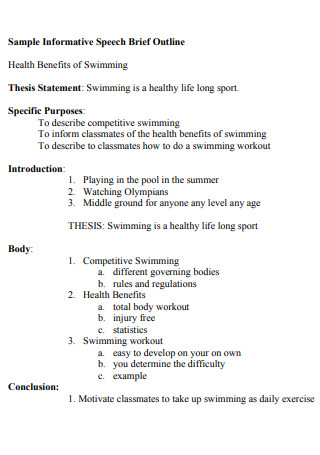
Informative Speech Brief Thesis Statemen
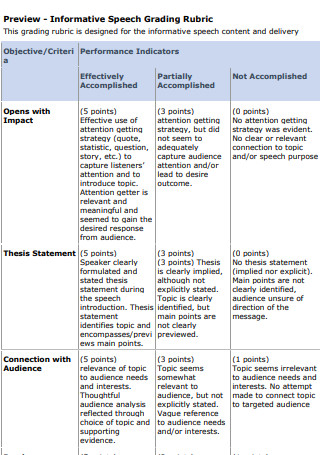
Informative Speech Grading Thesis Statement
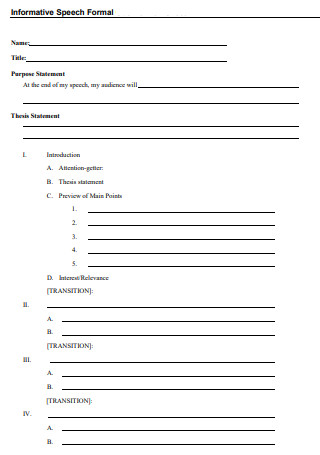
Informative Speech Formal Thesis Statement
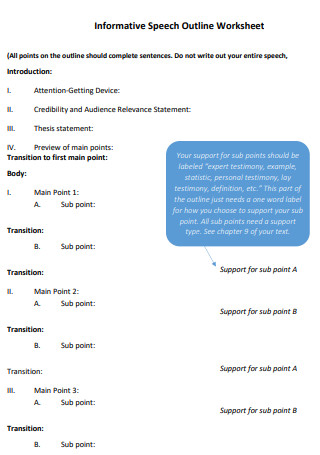
Informative Speech Outline Thesis Statement
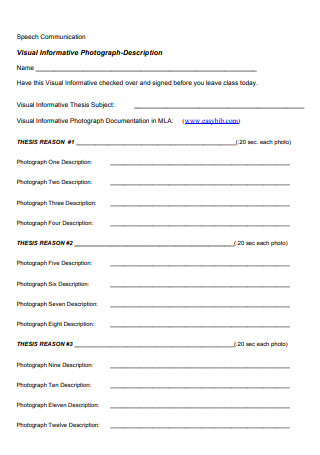
Informative Speech Rehearsal Thesis Statement
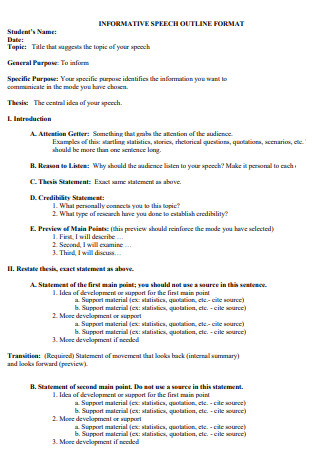
Informative Speech Thesis Statement Format
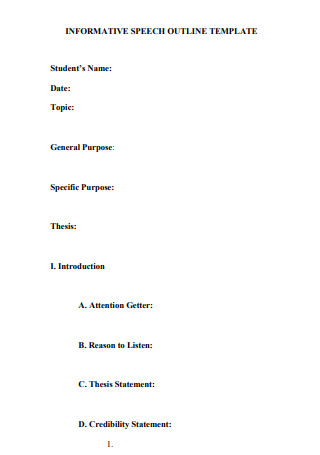
Student Informative Speech Thesis Statement
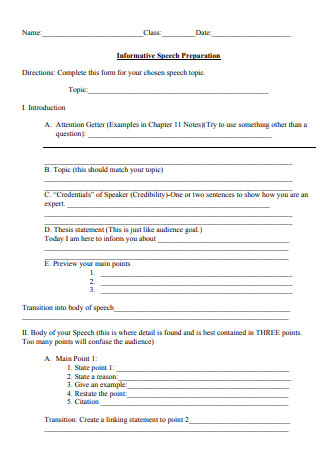
Informative Speech Preparation Thesis Statement
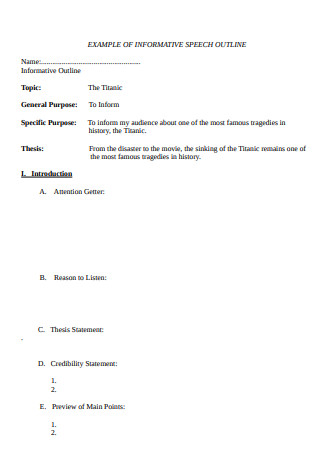
Informative Speech Topic Thesis Statement
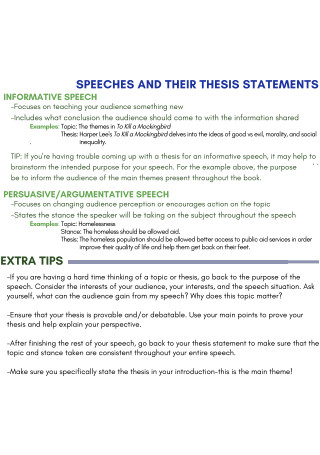
Informative Argumentative Speech Thesis Statement
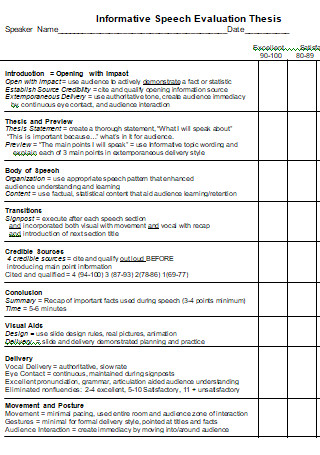
Informative Speech Evaluation Thesis Statement
Step 1: research, step 2: outline, step 3: introduction, step 4: body, step 5: conclusion, share this post on your network, file formats, word templates, google docs templates, excel templates, powerpoint templates, google sheets templates, google slides templates, pdf templates, publisher templates, psd templates, indesign templates, illustrator templates, pages templates, keynote templates, numbers templates, outlook templates, you may also like these articles, 20+ sample nursing personal statements in pdf | ms word.

Since the beginning of the COVID-19 pandemic, everyone began to realize just how critical the job of nurses was. Of course, even in the pre-pandemic era, nurses already played…
14+ SAMPLE Talent Statement in PDF
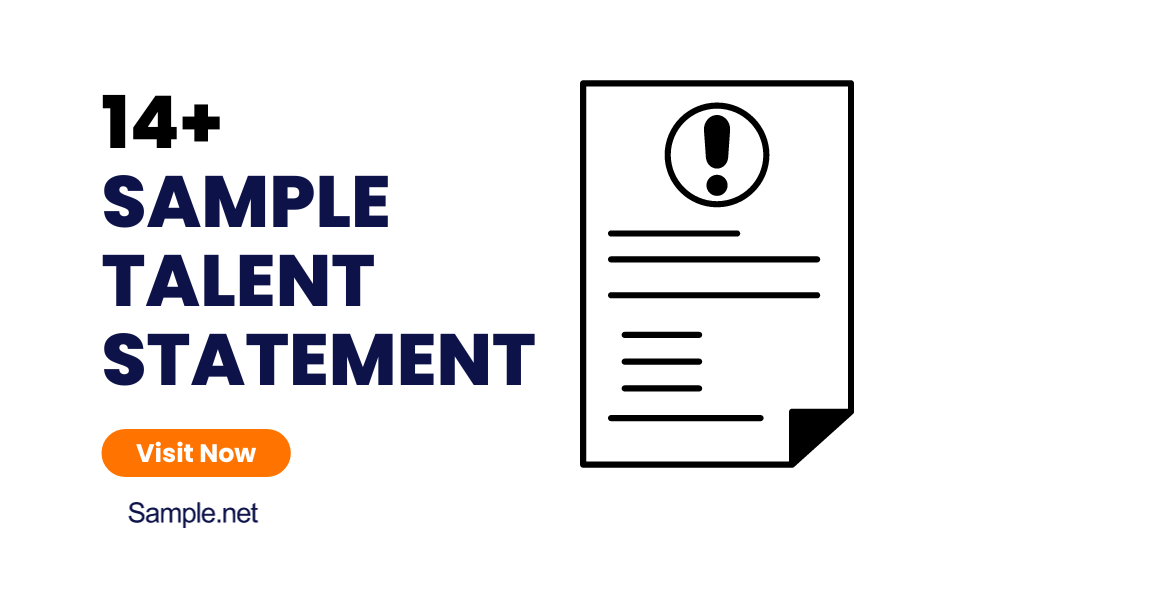
“Talent is cheaper than table salt. What separates the talented individual from the successful one is a lot of hard work,” Stephen King quotes. Talent acquisition specialists are often…
browse by categories
- Questionnaire
- Description
- Reconciliation
- Certificate
- Spreadsheet
Information
- privacy policy
- Terms & Conditions
- Business Templates
- Sample Statements
FREE 10+ Informative Speech Thesis Statement Samples [ Paper, Topic, Online ]

Each one of us has various opportunities for communication and social interaction. With different interactions, they are mostly guided by our perspectives and opinions of other people, our personal interpretations of a certain situation, and our individual insights of our personal identities, and more. That’s why communication greatly impacts our minds and influences our outlook around the world. This is also true when you make an informative speech for a school project or research paper work. So, if you’re currently struggling on how you will write a thesis statement, we include an informative guide and printable thesis statement samples in this article that you can use. Please continue reading!
Informative Speech Thesis Statement
Free 10+ informative speech thesis statement samples, 1. informative speech brief thesis statement, 2. informative speech grading thesis statement, 3. informative speech formal thesis statement, 4. informative speech outline thesis statement, 5. informative speech rehearsal thesis statement, 6. informative speech thesis statement format, 7. student informative speech thesis statement, 8. informative speech preparation thesis statement, 9. informative speech topic thesis statement, 10. informative argumentative speech thesis statement, 11. informative speech evaluation thesis statement, what is an informative speech thesis statement, how to write an informative speech thesis statement , 1. identify your main goal and purpose, 2. determine your target audience, 3. consider a definite length, 4. place it in the beginning part, what is a good thesis statement for an informative essay, how to write a good thesis statement , what are the four types of informative speech, what are some good topics for an informative speech.
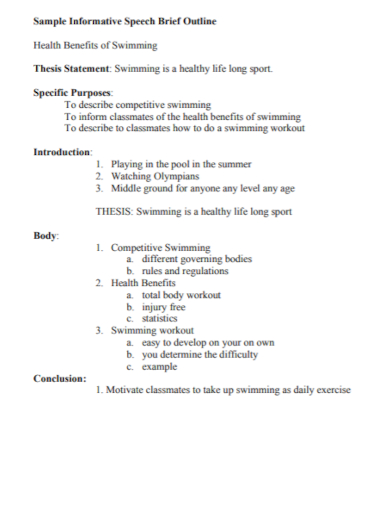
Size: 54 KB

Size: 51 KB

Size: 81 KB
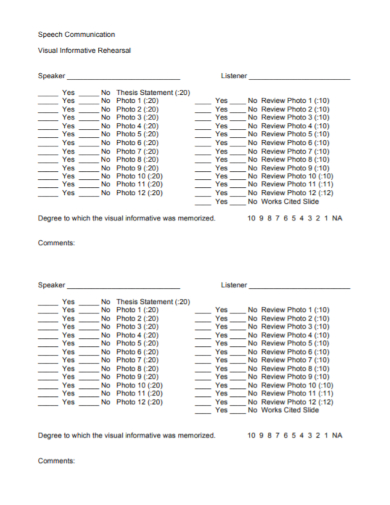
Size: 225 KB

Size: 74 KB

Size: 37 KB

Size: 113 KB

Size: 20 KB
A thesis statement for an informative speech is a brief and clear statement that contains the most important idea or key point of the speaker about a particular topic. It is essential to guide the overall flow and development of a speech.
Developing several effective informative speeches is all about sharing both new and relevant information for a certain audience. So, your main goal should be to design informative speeches that will significantly educate audiences. Below are important ways you can do to write a good thesis statement for your informative speech :
The first step is you need to identify your main goal and purpose of your informative speech. This will help you to select a proper topic that you will use. There are a wide array of topics that you can discuss so you need to have a specific purpose.
Next, determine who is going to be the audience of your speech . Use research tools and analyze your target audience. Dig deeper about their interests and preferences related to your topic material. In this way, you will increase the likelihood that your audience will find your speech worthwhile and valuable.
When you write an effective thesis statement for an informative speech, you need to think carefully and consider a definite length as it can be short or long, according to the main points that you want to present in your speech. Usually, it is written in a one brief sentence while comprising at least two clauses: an independent clause and a dependent clause. Focus on writing a single sentence with at least two lines, around 30 to 40 words long.
After considering the length of your thesis statement, you need to place it in the beginning part of your speech. As you tell the reader about what you are going to discuss, the thesis statement should be inside the introduction paragraph of your speech.
When writing a good thesis statement for an informative essay, you need to clearly explain the essence of your essay and summarize all things that you have researched.
First, you need to identify a specific question about your main topic. Then, write a simple draft of your initial answer. After that, elaborate your answer while including other facts, opinions, and other reasons.
The four types of informative speech are descriptive, definition, demonstrative, and explanatory.
Some good topics for an informative speech are the importance of sleep, treatment of chronic diseases, the causes and impact of psychological disorders, significance of eating a balanced meal, the importance of technology in healthcare systems, and many more .
According to the book “ The Challenge of Effective Speaking in a Digital Age ”, in order to sustain the attention and interest of your listeners, you need to create familiar topics that are intellectually stimulating with new and relevant insight as you tap your audience’s curiosity, incorporate listener relevance links throughout your speech, conduct good research and practice productive thinking to craft creative informative speeches, and emphasize specific goals and key points. To help you write a clear and compelling thesis statement, you can click and download our good thesis statement examples here!
Related Posts
Free 51+ introduction speech samples, free 22+ endorsement letter samples, free 15+ sample outline, free 11+ sample elevator pitch, free 11+ speech writing samples, free persuasive speech samples, free 9+ speech samples, free 9+ retirement speech, free 7+ informational writing samples, free 6+ sample mla cover page, free 12+ sample informative speech, free 11+ professional writing samples, free 10+ informative writing samples, free 9+ sample mla outline, free 8+ sample speech outline, free 9+ informative speech samples, free 8+ sample ceremonial speech, free 7+ self introduction speech samples.
Informative Thesis Statement Generator
Even though some studies show that school uniform’s adoption improves students’ performance, school uniform should not be adopted at schools because it limits students’ individuality, it is a burden for low-income families, and it restricts students’ physical activity.
Whereas some studies show that school uniform’s adoption improves students’ performance, school uniform should not be adopted at schools given that it limits students’ individuality, it is a burden for low-income families, and it restricts students’ physical activity.
Looking for an informative speech thesis statement generator to create a thesis from scratch? Or want to check if the one you’ve formulated is looking good? Try a free online tool we’ve made.
- ️👍 Informative Thesis Statement Generator: the Benefits
- ️🛠️ How to Use the Tool
- ️💬 Informative Speech: the Basics
- ️⚠️ Informative Thesis Statement
- ️🐾 Steps to Prepare an Informative Speech
- ️🎓 What Is a Credibility Statement?
- ️🔗 References
👍 Informative Thesis Statement Generator: the Benefits
Here are the key benefits of this thesis statement generator for informative essays.
🛠️ Informative Thesis Statement Generator: How to Use It
- What is the main conclusion you plan to make in your speech? Write the main idea in one sentence.
- What is the central argument for your conclusion? Briefly explain why you developed this opinion.
- Add other arguments if necessary. But make sure they are not as critical as the first one.
- Press “ Make Your Thesis .”
💬 What Is Informative Speech?
As it naturally flows from the name, informative speech educates the listeners on a particular topic . As a rule, informative speakers focus on complicated issues, breaking them down into constituent parts. In such a way, they help the listeners “digest” complex notions.
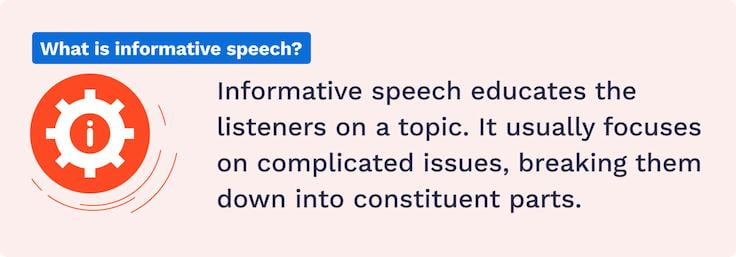
This speech genre may have some features of persuasive, compare and contrast, or argumentative essay. However, its primary purpose is to inform, not to persuade, compare, or argue.
How to make a successful topic for an informative speech ? First, it should be useful for the audience to be motivated to listen. Second, it should be engaging. Because as you call the boat, so it will float. Here’re a couple of good examples:
- The ghosts of Hamlet’s characters in contemporary literature. It’s quite an intriguing title because everybody likes ghost stories.
- The ways technology makes us lazy. People don’t tend to think they’re lazy, so the topic defies them.
Informative Speech Types
Although informative speech always informs its listeners, various types do this differently.
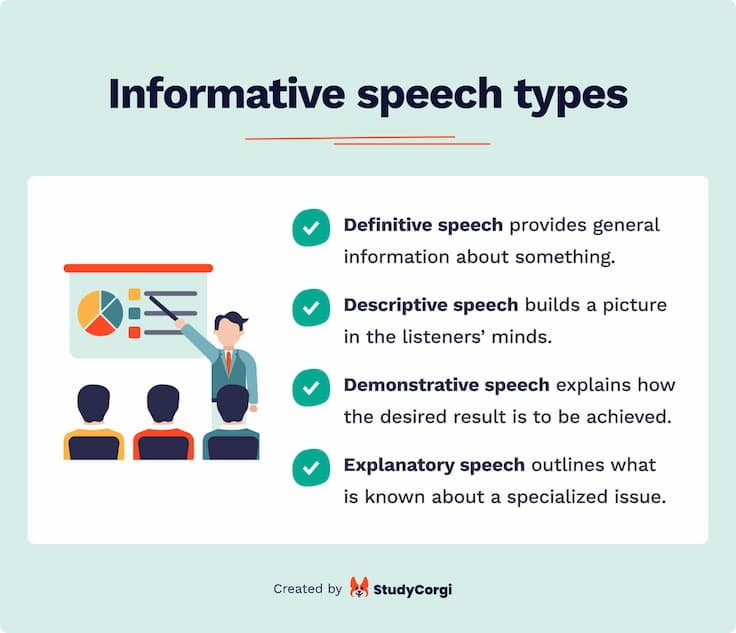
Definitive speech provides general information regarding an event, phenomenon, or personality. Its purpose is to educate the listeners. For instance, “What is a market economy?” could be a good definitive speech topic.
- Descriptive
Descriptive speech employs vivid language and imagery to build a memorable picture in the listeners’ minds. It is the most emotional type of genre. For example, “The best day of my life.” is a nice idea for a descriptive speech.
- Demonstrative
Demonstrative (or demonstration) speech explains how certain actions should be done to achieve the desired result. “How to write an introduction of a research paper” is an excellent example of this format.
- Explanatory
Explanatory speech outlines the existing state of knowledge regarding a specialized issue. Most of them are delivered at professional conferences and include statistics and other visual data representations. A topic example would be “Why iPhone has not dominated the market yet.”
⚠️ What Is Informative Speech Thesis Statement?
A thesis statement in an informative speech is essential to summarize what facts you plan to convey to your audience. Still, the simple definition doesn’t make the thesis any easier to write (or improvise while speaking). This 15 to 20 word-sentence should contain the central idea and suggest what you will not cover in your speech. It should also be clear and accessible.
Look at the blank fields of our informative speech thesis statement generator. They form a perfect template for your statements:
Argument 1 + Argument 2 + Argument 3 = Thesis
As you can see, the three items inform the reader what it will all be about while delineating the topic coverage.
📝 Informative Speech Thesis Statement Examples
🐾 steps to prepare a killing informative speech.
Below you’ll find the steps necessary to prepare a killing informative speech.
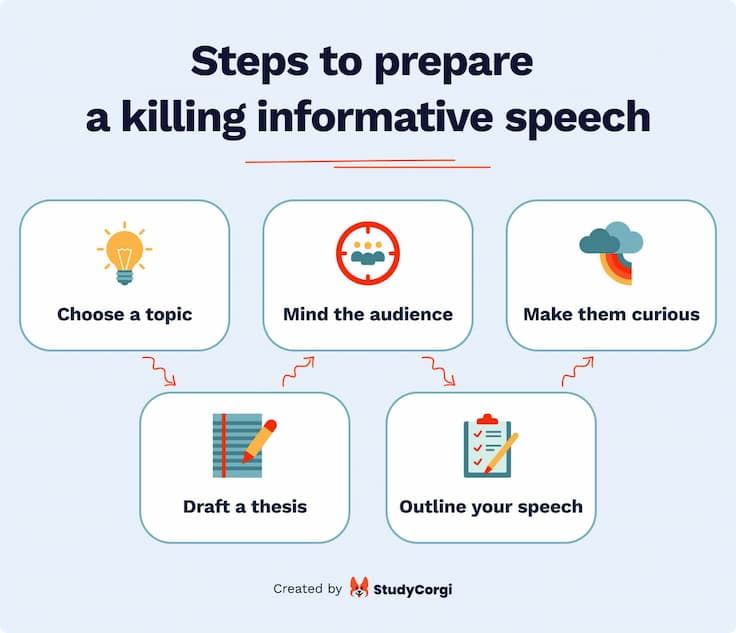
Thank you for reading this article! Note that if you need to get a restated thesis quickly, you can try the free rephrasing tool we’ve made.
🎓 What Is a Credibility Statement?
A credibility statement is made by a speaker or writer at the beginning of a text or speech. It aims to convince the audience that it makes sense to pay attention to and trust the information since the author is an expert in the respective field. A credibility statement usually includes information about the author's qualifications, experience, and background related to a particular topic.
❓ Informative Thesis Statement Generator FAQ
What is a thesis in an informative speech.
A thesis in an informative speech is a summary of the key facts or ideas the speaker intends to convey to the audience. This sentence outlines the contents and informs on the author’s purposes. The thesis should be reiterated at the end of the speech to help the listeners recollect what it was about.
How to Write a Thesis Statement for an Informative Speech?
Use the main idea to compose a declarative statement. It should provide clear but concise information about the central message of your speech. Meanwhile, it should fit into one sentence. Or you can use this Informative speech thesis generator and only edit the result.
What Is the Difference Between an Informative Speech and a Persuasive Speech?
Informative speech uses facts and arguments to educate the listeners. But persuasive speech uses the same to make the audience change their minds or follow the speaker’s advice. The latter is usually more complicated and follows a stricter pattern.
What Is a Credibility Statement in an Informative Speech?
A credibility statement explains that you have the necessary experience or qualifications to deliver the speech on the given topic. It shows the audience that your opinion is trustworthy and reliable. It can also mention the reasons for speaking and your motivation to inform the listeners.
📍 References
- 9 Types of Informative Speeches To Educate an Audience
- Informative Speaking | Department of Communication
- Purposes of Informative Speaking - The WAC Clearinghouse
- Informative Thesis Statement Examples
- Strong Thesis Statements // Purdue Writing Lab

IMAGES
VIDEO
COMMENTS
An informative speech thesis statement conveys the main idea of your speech, providing an overview of what listeners should expect. It aims to educate, enlighten, and provide essential details on a specific topic without persuading or arguing a perspective. Today, we'll explore the mysterious world of the deep sea and the creatures that ...
Crafting a Thesis Statement. A thesis statement is a short, declarative sentence that states the purpose, intent, or main idea of a speech. A strong, clear thesis statement is very valuable within an introduction because it lays out the basic goal of the entire speech. We strongly believe that it is worthwhile to invest some time in framing and ...
For example, if a speaker wants to write an informative speech about different types of popular dog breeds, the thesis statement should not just be: There are many types of dog breeds. Instead ...
An informative thesis statement explains the topic and summarizes the major findings of an informative essay for the reader. Learn more about the definition of informative thesis statements ...
Thesis Statements. A thesis is the main claim you are making in an argument, similar to the hypothesis in a scientific experiment. It is what you are trying to prove or persuade your audience to believe or do. It's helpful to develop a working thesis to guide your composition process. "Working" is the operative word here; your ideas are ...
As mentioned earlier, your thesis statement is a brief summary of the rest of your speech. Add a transition that allows you to flow into the first key point of your informative speech outline example. Constructing the Body of Your Speech. Writing the body of your informative speech is a lot easier thanks to your outline.
Focus on a specific aspect of your topic and phrase the thesis statement in one clear, concise, complete sentence, focusing on the audience. This sentence sets a goal for the speech. For example, in a speech about art, the thesis statement might be: "The purpose of this speech is to inform my audience about the early works of Vincent van Gogh."
A thesis can be found in many places—a debate speech, a lawyer's closing argument, even an advertisement. But the most common place for a thesis statement (and probably why you're reading this article) is in an essay. Whether you're writing an argumentative paper, an informative essay, or a compare/contrast statement, you need a thesis.
A thesis statement is a declarative statement that expresses your paper's position or main topic. It fulfills the several roles of your paper, whether it's a research paper, an essay for coursework, or a speech. Make sure to place your thesis statement at the end of your introduction before your first body paragraph. More Thesis Statement ...
Step 2: Write your initial answer. After some initial research, you can formulate a tentative answer to this question. At this stage it can be simple, and it should guide the research process and writing process. The internet has had more of a positive than a negative effect on education.
How to write a thesis statement for a speech for either an informative or persuasive presentation. FREE 7 Instant Tips for Confident & Composed Public Speaki...
How to write an informative speech. Regardless of the type, every informative speech should include an introduction, a hook, background information, a thesis, the main points, and a conclusion. Introduction. An attention grabber or hook draws in the audience and sets the tone for the speech. The technique the speaker uses should reflect the ...
Begin with introducing a succinct thesis statement that briefly summarizes the main points of your speech. This will give the audience a clear idea of what topics you will be discussing and help retain their attention throughout your speech. ... Examples of Effective Informative Speech Outlines. Informative speeches must be compelling and ...
Example of an Informative Speech Outline. Topic: This will be the title of your speech. Purpose: To inform the audience about the topic. Thesis: A theme statement that clearly describes the topic and points made in the presentation.
Having a strong thesis statement in public speaking helps you stay focused on your main argument throughout the speech and ensures that your audience understands what you are trying to communicate. It also helps establish credibility and authority as you present well-supported points related to your thesis. 4.
Step 3: Introduction. Your thesis statement should ideally be found in the first few paragraphs of your informative speech. You can open your speech with attention getters or attention-grabbing statements or even questions. The key is to be able to hook the listener with your opening statements.
Writing a Thesis Statement - A thesis statement is a complete sentence that expresses the speaker's most important idea, or key point, about a topic. A thesis statement guides the development of a speech. Examples: 1. Specific purpose: "I want to explain the characteristics of the six major classifications of show dogs."
What is an Informative Speech Thesis Statement? A thesis statement for an informative speech is a brief and clear statement that contains the most important idea or key point of the speaker about a particular topic. It is essential to guide the overall flow and development of a speech. How to Write an Informative Speech Thesis Statement
Focus on a specific aspect of your topic and phrase the thesis statement in one clear, concise, complete sentence, focusing on the audience. This sentence sets a goal for the speech. For example, in a speech about art, the thesis statement might be: "The purpose of this speech is to inform my audience about the early works of Vincent van Gogh."
Below are 15 examples of informative speech topics that are sure to engage and educate your audience. The history and evolution of social media platforms. The benefits and drawbacks of renewable energy sources. The impact of sleep deprivation on mental and physical health. The role of emotional intelligence in personal and professional success.
A thesis statement in an informative speech is essential to summarize what facts you plan to convey to your audience. Still, the simple definition doesn't make the thesis any easier to write (or improvise while speaking). ... This sample of an informative thesis statement sets the stage for a speech on political science. Although the sentence ...